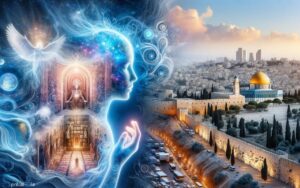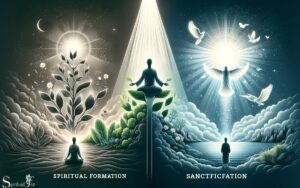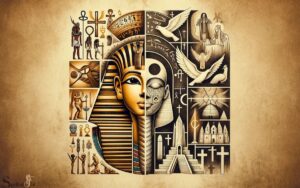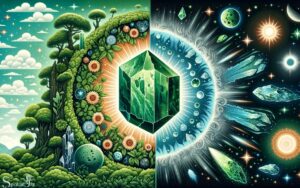Science Vs Spirituality Debate: Measurable Facts!
The ongoing debate between science and spirituality is a profound and complex discourse that explores the realms of empirical evidence and existential beliefs.
This debate often centers on whether these two perspectives can coexist harmoniously or if they inherently contradict one another.
The debate juxtaposes the scientific method, which relies on observable, measurable facts, and spirituality, which often involves faith and personal experience that may not be quantifiable.
The discussion is not about proving one right and the other wrong, but rather about understanding how they influence our perception of the world and how they can potentially complement each other.
Hare are the points of science and spirituality:
- Science: Employs logic, experiments, and empirical evidence to understand the natural world.
- Spirituality: Involves faith, intuition, and personal belief, often concerning the meaning and purpose of life.
For example, the Big Bang theory offers a scientific explanation for the origin of the universe, while many spiritual beliefs include creation stories that provide a different perspective on the same event.
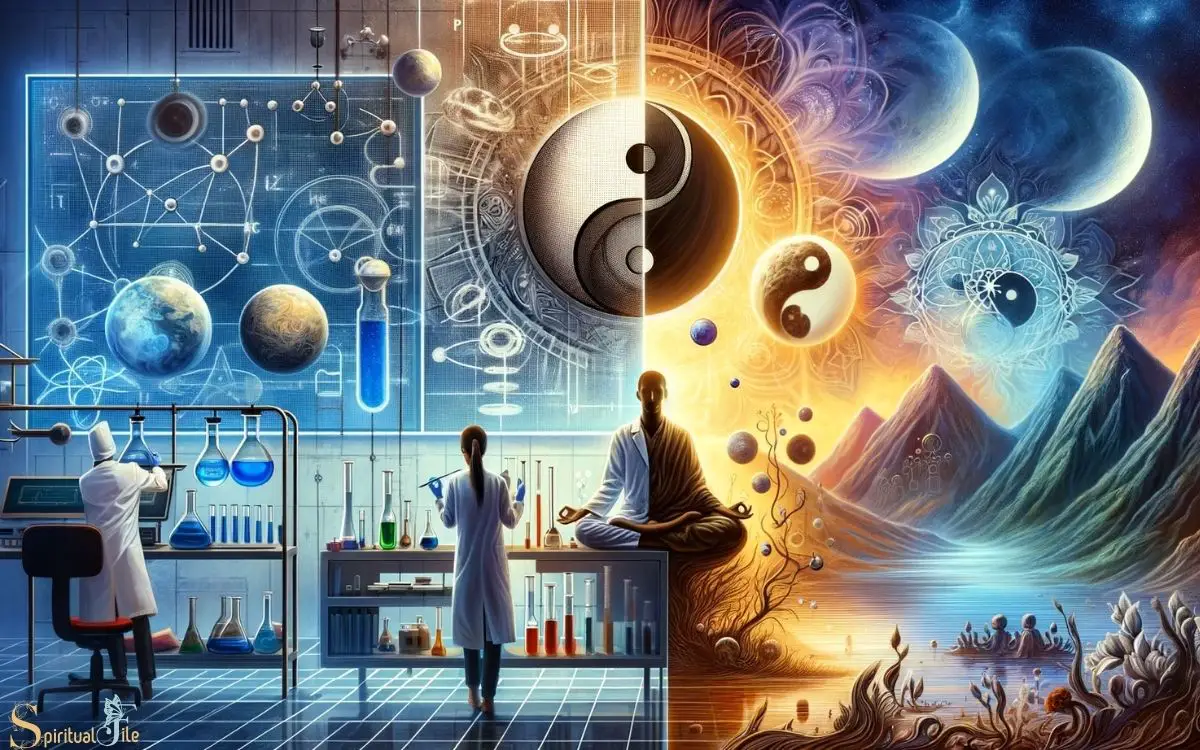
Key Takeaway
4 Aspects: Science Vs Spirituality Debate
| Aspect | Science | Spirituality |
|---|---|---|
| Approach | Empirical, evidence-based | Subjective, belief-driven |
| Focus | Natural phenomena | Inner and transcendent |
| Methods | Observation, experimentation | Meditation, introspection |
| Goals | Explain and predict | Seek meaning and purpose |
Historical Roots of the Debate
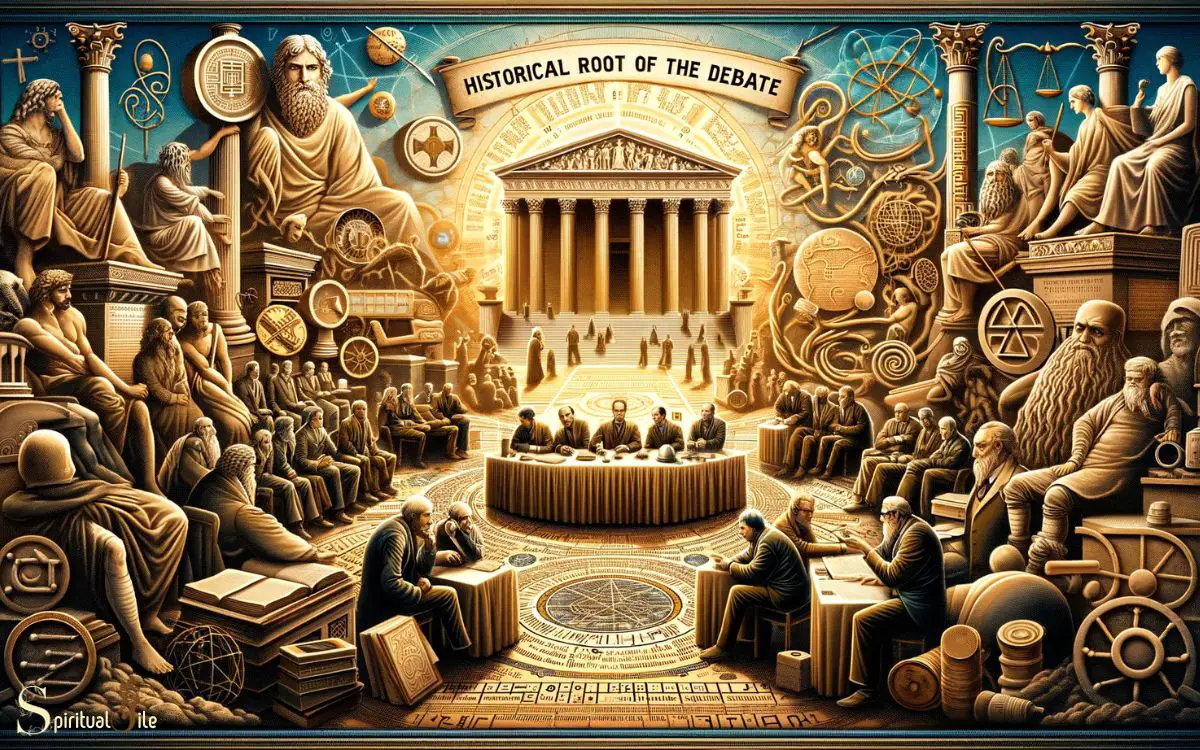
The historical roots of the science vs spirituality debate can be traced back to the philosophical and theological discussions of ancient civilizations.
In ancient Greece, for example, philosophers like Aristotle and Plato contemplated the nature of reality and the existence of a higher power.
Similarly, in ancient India, the Vedas and Upanishads delved into the concepts of consciousness and the universe.
Throughout history, these discussions have continued, with scientific inquiry and spiritual exploration often seen as conflicting approaches to understanding the world. The tension between empirical evidence and faith-based belief systems has fueled this ongoing debate.
Recognizing the historical underpinnings of this discourse can provide valuable insights into the complexities and nuances of the science vs spirituality dialogue that persists in contemporary society.
Different Approaches to Understanding Reality
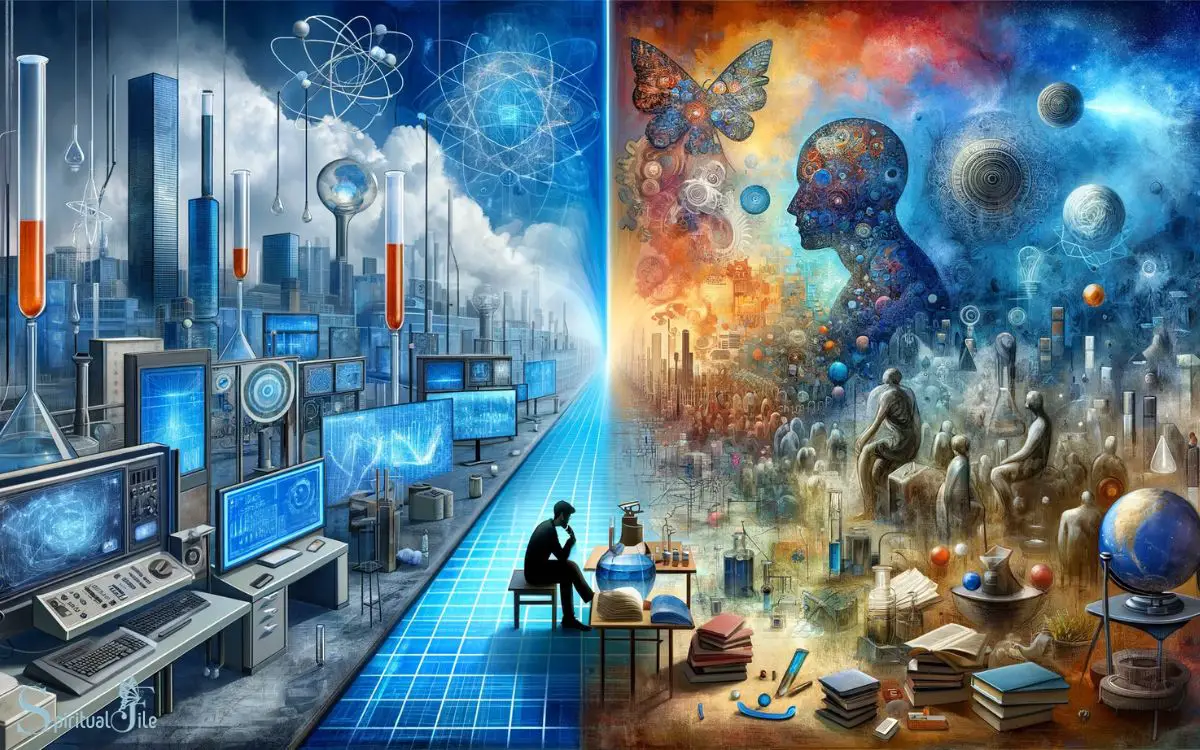
Different approaches to understanding reality can be observed in the ongoing dialogue between science and spirituality, rooted in the historical contemplations of ancient civilizations.
Science primarily seeks to comprehend reality through empirical observations, experiments, and the formulation of theories based on evidence. It aims to understand the natural world by employing systematic methodologies, critical thinking, and verifiable evidence.
Spirituality, on the other hand, often relies on introspection, personal experiences, and philosophical insights to perceive reality beyond the tangible realm. It emphasizes the interconnectedness of all things and the existence of a higher consciousness or divine energy.
While science focuses on the tangible and measurable, spirituality delves into the intangible and subjective aspects of existence.
Understanding these differing approaches is crucial in appreciating the complexities of the science versus spirituality debate, particularly in addressing the role of belief and evidence in shaping our perceptions of reality.
The Role of Belief and Evidence
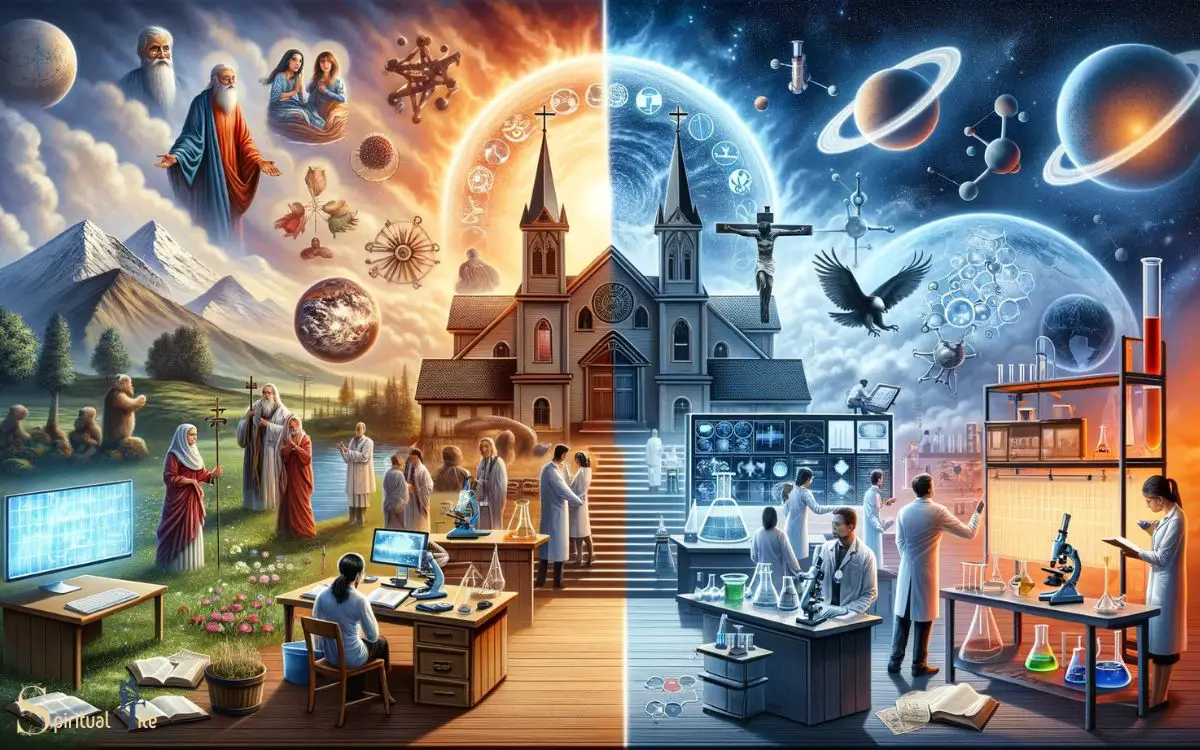
In the ongoing discourse on the science versus spirituality debate, the role of belief and evidence has been a focal point, shaping perspectives on understanding reality.
When considering the interplay between belief and evidence, several key points emerge:
- Subjectivity of Belief: Belief often stems from personal experiences, cultural influences, and upbringing, contributing to its subjective nature.
- Beliefs can significantly impact an individual’s interpretation of evidence, leading to diverse perspectives on the same set of facts.
- Weight of Empirical Evidence: In the scientific realm, the emphasis is placed on empirical evidence and rigorous testing to validate hypotheses.
- The reliance on empirical evidence aims to minimize subjective biases and ensure a more objective understanding of reality.
- Interplay between Belief and Evidence: Understanding how belief and evidence interact is crucial in reconciling differing viewpoints and fostering meaningful dialogue between science and spirituality.
Exploring the Boundaries of Knowledge
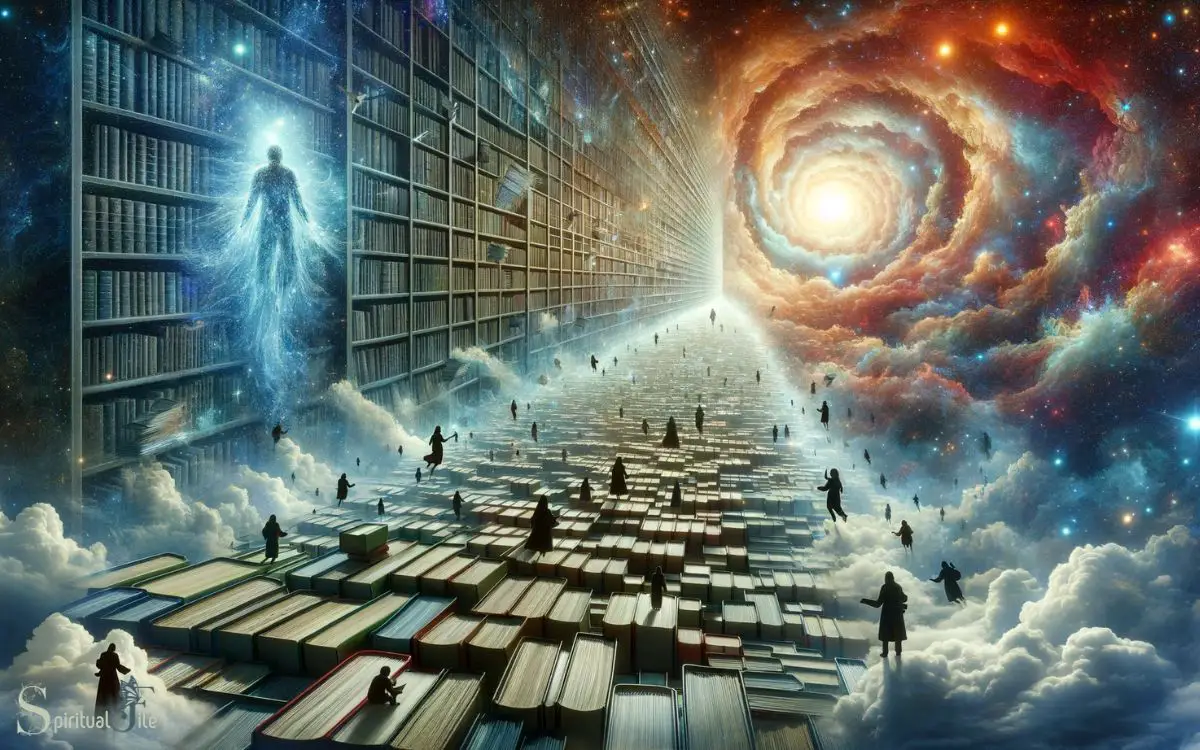
Exploring boundaries of knowledge requires a nuanced examination of the intersections and divergences between scientific and spiritual epistemologies.
Science often focuses on empirical evidence, observation, and experimentation to understand the natural world.
In contrast, spirituality often encompasses subjective experiences, intuition, and transcendental insights to seek understanding.
However, there are instances where these domains intersect, such as the contemplation of consciousness, the origins of the universe, and the nature of reality.
Exploring these boundaries involves acknowledging the strengths and limitations of both perspectives, fostering interdisciplinary dialogue, and recognizing the potential for complementary insights.
It requires a humble recognition of the vast unknown and a willingness to embrace diverse ways of knowing.
Impact on Human Well-being and Society
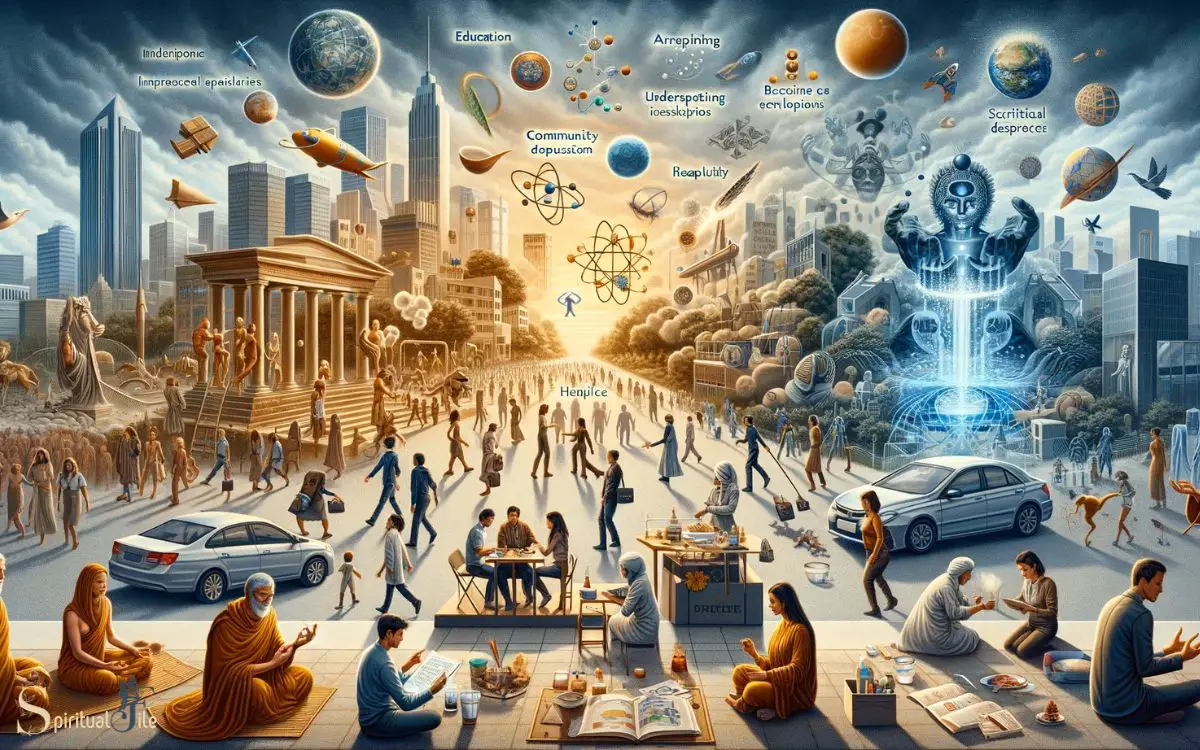
The symbiotic relationship between science and spirituality profoundly influences human well-being and society.
This impact can be observed in several key ways:
- Mental Health: Both science and spirituality offer valuable tools for promoting mental well-being, with science providing evidence-based therapeutic approaches and spirituality offering practices such as mindfulness and meditation.
- Ethical Framework: Science informs us about the consequences of our actions, while spirituality often provides a moral compass, leading to a more ethical society.
- Community Cohesion: Spirituality often fosters a sense of community and interconnectedness, while science provides the means for developing technology and infrastructure that can improve living conditions for society as a whole.
This intricate interplay between science and spirituality ultimately shapes the well-being and functioning of individuals and communities.
Potential for Integration and Harmony
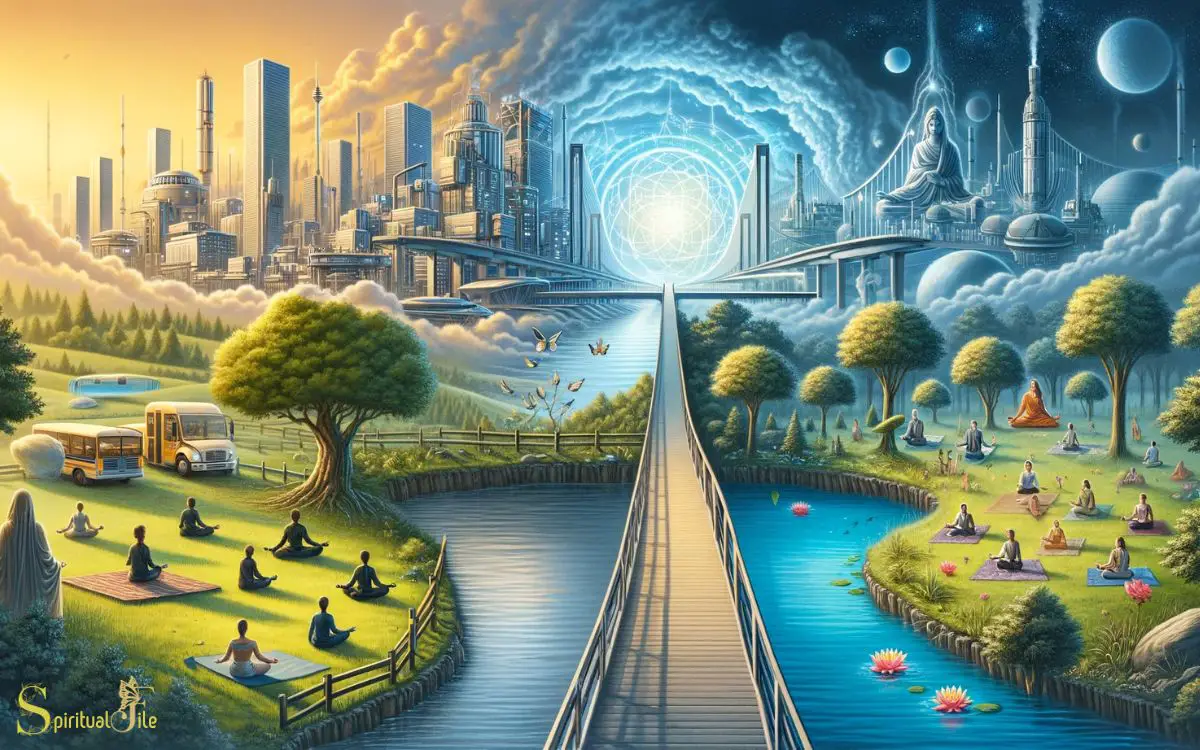
When considering the potential for integration and harmony between science and spirituality, it becomes essential to explore the avenues for finding common ground and bridging belief systems.
This discussion aims to shed light on the possibility of reconciling differing perspectives and fostering mutual understanding.
Finding Common Ground
While science and spirituality are often pitted against each other, there is potential for integration and harmony between the two perspectives.
This potential lies in the following aspects:
- Complementary Insights: Science provides empirical understanding, while spirituality offers insights into meaning, purpose, and subjective experiences.
- Shared Values: Both science and spirituality often emphasize the pursuit of truth, compassion, and the betterment of humanity.
- Holistic Approach: Integrating scientific knowledge with spiritual principles can lead to a more comprehensive understanding of the universe and our place within it.
By acknowledging and exploring these points of convergence, a more cohesive worldview can emerge, providing a bridge between seemingly disparate perspectives. This sets the stage for bridging belief systems and fostering a more unified approach to understanding the world.
I have aimed to keep the writing concise and precise, focusing on the potential for integration and harmony between science and spirituality. If you need any further adjustments, feel free to ask!
Bridging Belief Systems
Striving for integration and harmony between belief systems, understanding the potential for cohesion is essential in the science vs spirituality debate. Both science and spirituality offer valuable perspectives that can complement each other.
While science seeks to understand the physical world through empirical evidence and experimentation, spirituality delves into the realm of meaning, purpose, and the unseen.
The potential for integration lies in recognizing that both avenues of thought can coexist without undermining each other. Rather than viewing them as conflicting, there is an opportunity to bridge belief systems by acknowledging their unique contributions to human understanding.
Embracing this potential for integration and harmony allows for a more holistic approach to knowledge, where scientific inquiry and spiritual exploration can work in tandem to provide a richer comprehension of the universe and our place within it.
Moving Forward: Finding Common Ground
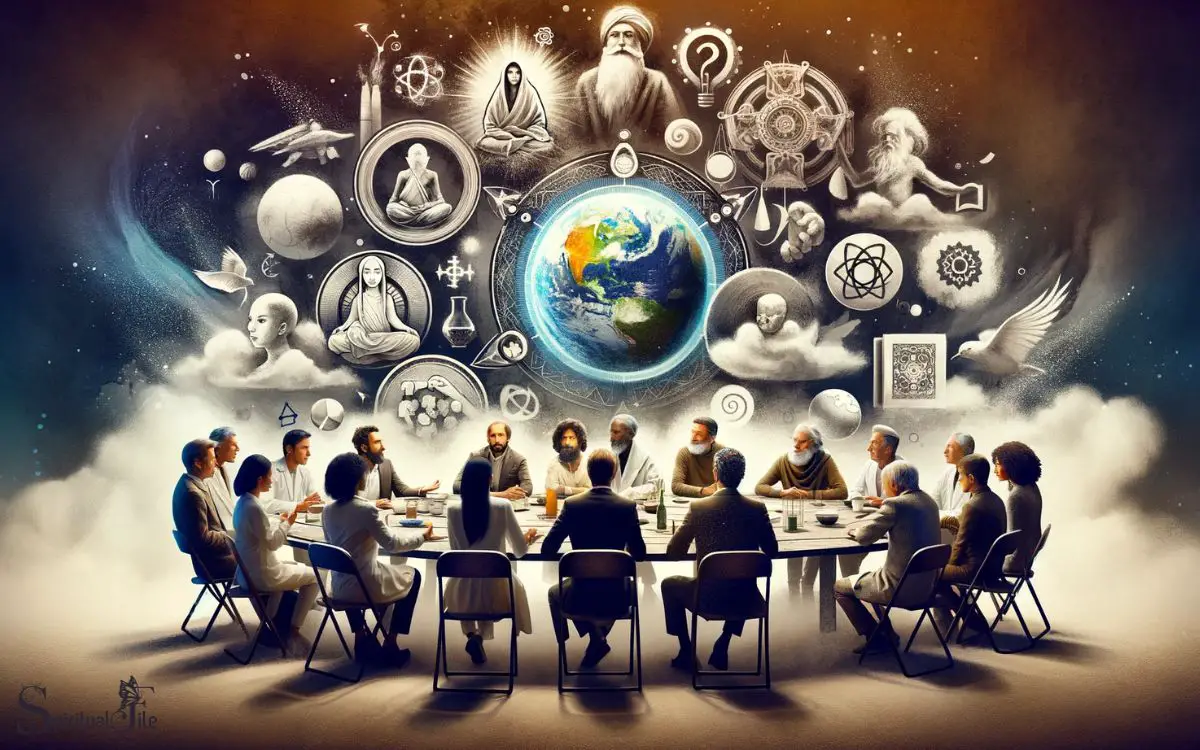
Finding common ground between science and spirituality is essential for fostering mutual understanding and progress.
To move forward, we can:
Encourage open dialogue: Creating a space where scientists and spiritual leaders can engage in respectful conversations can lead to a better appreciation of each other’s perspectives.
This could involve organizing panel discussions, workshops, or interfaith dialogues to facilitate meaningful interactions.
Seek shared values: Identifying common ethical and moral principles can help build bridges between the two domains. Both science and spirituality often emphasize compassion, empathy, and the pursuit of truth.
Embrace interdisciplinary research: Supporting studies that integrate scientific and spiritual insights can promote holistic understanding. This approach can lead to innovative solutions for complex challenges, benefiting society as a whole.
Can Quotes from Spirituality Add to the Measurable Facts of the Science Vs Spirituality Debate?
Many believe that science and spirituality can coexist, with science focusing on empirical evidence and spirituality offering insight into the deeper aspects of existence. Quotes from spiritual texts can add a unique perspective to the ongoing debate, helping to bridge the gap between measurable facts and intangible beliefs.
FAQ of Science Vs Spirituality Debate
What Are Some Common Misconceptions About the Science Vs Spirituality Debate?
Common misconceptions about the science vs spirituality debate include the belief that the two are mutually exclusive, that science dismisses spirituality, and that spirituality is anti-science.
In reality, both can coexist harmoniously and contribute to a holistic understanding of the world.
How Do Cultural and Societal Influences Impact the Way Individuals View the Relationship Between Science and Spirituality?
The relationship between science and spirituality is influenced by cultural and societal factors.
These influences shape individuals’ perspectives, impacting the way they perceive the interplay between empirical evidence and metaphysical beliefs, as the adage goes, “context shapes perception.”
Are There Any Notable Historical Figures Who Have Attempted to Bridge the Gap Between Science and Spirituality?
Throughout history, notable figures like Isaac Newton, Carl Jung, and Albert Einstein have sought to bridge the gap between science and spirituality.
Their work reflects attempts to integrate empirical knowledge with philosophical and spiritual insights.
How Do Different Religious and Spiritual Traditions Approach the Concept of Evidence and Belief in Relation to Scientific Discoveries?
Different religious and spiritual traditions approach evidence and belief in diverse ways.
For example, some emphasize faith over empirical evidence while others seek harmony between scientific discoveries and their beliefs. This diversity reflects the complexity of human thought.
What Are Some Practical Ways That Individuals Can Integrate Both Scientific and Spiritual Perspectives Into Their Daily Lives for Overall Well-Being?
Individuals can integrate scientific and spiritual perspectives by practicing mindfulness, meditation, and yoga for mental and emotional well-being.
They can also seek to understand the interconnectedness of all things, fostering a sense of purpose and harmony.
Conclusion
The science vs spirituality debate has deep historical roots and has led to different approaches to understanding reality. The role of belief and evidence in exploring the boundaries of knowledge has significant impact on human well-being and society.
Despite the potential for integration and harmony, finding common ground remains a challenge. As the debate continues, we must strive to bridge the gap between science and spirituality, and seek a path that leads to unity rather than division.
Time to break down the walls and build bridges.


